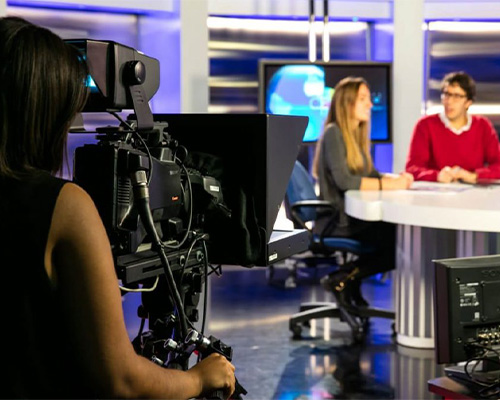- August 3, 2023
- Posted by: admin
- Categories:

Course Overview
Welcome to the Bachelor of Broadcasting & Journalism program! This dynamic and comprehensive degree is designed to prepare aspiring journalists and broadcasters with the skills and knowledge necessary to excel in the fast-paced and ever-evolving media industry.
Program Objectives: The Bachelor of Broadcasting & Journalism program aims to produce media professionals who possess a deep understanding of journalistic principles, strong storytelling capabilities, multimedia production skills, and an ethical approach to news reporting. Throughout the program, students will:
- Master Journalism Foundations: Acquire the fundamental principles of journalism, including news writing, reporting, interviewing, fact-checking, and newsroom ethics.
- Develop Multimedia Storytelling Skills: Learn to craft compelling stories across various platforms, including print, broadcast, digital media, and social media.
- Embrace Broadcast Production Techniques: Gain hands-on experience in broadcast production, including radio and television reporting, video shooting, editing, and producing.
- Understand Media Law and Ethics: Study media law, defamation, privacy, and libel to ensure responsible and ethical journalism practices.
- Engage in Newsroom Simulations: Participate in newsroom simulations and practical projects to experience real-life reporting scenarios and deadline-driven environments.
- Explore Investigative Journalism: Learn investigative reporting techniques to delve into complex issues and produce in-depth, fact-based reports.
- Develop Digital Media Skills: Acquire skills in digital journalism, online storytelling, data journalism, and multimedia production for digital platforms.
- Master Visual Storytelling: Learn visual storytelling techniques, including photojournalism, infographics, and video storytelling, to enhance reporting.
- Broadcast Journalism and Presentation: Develop skills in live reporting, scriptwriting, and on-camera presentation for radio and television broadcasts.
Program Structure: The Bachelor of Broadcasting & Journalism program typically follows a structured curriculum that includes core journalism courses, broadcasting courses, practical experiences, and electives. Students will have opportunities to work in state-of-the-art media labs and studios, gaining practical skills and industry exposure.
Key components of the program include:
- Journalism Foundations: These courses cover the basics of journalism, including news writing, reporting, media law, and media ethics.
- Broadcast Journalism: Students will learn radio and television reporting techniques, studio production, and on-air presentation skills.
- Multimedia Storytelling: This unit focuses on multimedia journalism, including video production, digital storytelling, and online journalism.
- Investigative Journalism: Students will explore investigative reporting methods, data journalism, and the role of journalism in holding institutions accountable.
- Digital Media and Social Media Journalism: This unit delves into digital journalism trends, social media reporting, and audience engagement strategies.
- Newsroom Internship: Students will undertake a supervised internship at media organizations, gaining practical experience and building professional connections.
- Media Ethics and Media Law: Explore ethical considerations in journalism, media law, and the responsibilities of media professionals in society.
- Feature Writing and Long-Form Journalism: Develop feature writing skills, including human interest stories, profiles, and long-form journalistic pieces.
- Newsroom Management and Media Entrepreneurship: This unit covers newsroom management principles and introduces the concept of media entrepreneurship for aspiring media leaders.
- Capstone Project: The capstone project serves as the culminating experience of the program. Students will produce an in-depth journalistic project, showcasing their skills and expertise in broadcasting and journalism.
Admissions Requirements: Admission requirements may vary depending on the institution offering the program. Generally, applicants should have completed high school or an equivalent qualification. Some programs may require specific subject prerequisites, writing samples, interviews, or a portfolio showcasing an interest in journalism or media.
Duration: The program’s duration typically spans three to four years of full-time study, depending on the institution and any credit transfers for prior learning.
Graduation and Certification: Upon successful completion of the program, students will be awarded the Bachelor of Broadcasting & Journalism degree, signifying their readiness to embark on a successful career in journalism, broadcasting, media production, or related fields.
Join us on this exciting journey to become skilled journalists and broadcasters who can craft compelling stories, deliver accurate news, and contribute to the media landscape. Together, we will empower you to become a trusted and influential voice in the world of journalism and broadcasting.
